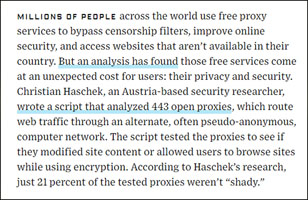Proxy Service Scams
Stay vigilant against proxy service scams to safeguard your online activities. Understand the risks posed by fraudulent proxy servers and follow essential tips to enhance your online security. Report any suspicious activities promptly to protect yourself and others from falling victim to cybercrime.
Businesses, corporations, and individuals engaging in online financial transactions face a growing threat of cybercrime. Many have fallen victim to scammers, who frequently change identities, making it challenging for authorities to track them. With the rise of phishing scams, users must exercise extreme caution with emails and websites. Notably, scams involving proxy services and settings are gaining prominence, particularly targeting users of banking websites. Scammers often send deceptive emails appearing official, leading users to fraudulent websites where their login credentials are exploited for quick financial gains. Stay vigilant in the face of evolving cyber threats.
Guarding Against Proxy Server Scams: A Vital Reminder for Online Safety
Cybercrime authorities have observed a sudden surge in such scams, prompting warnings to the public about the risks associated with using login credentials. Scammers adeptly exploit the technical intricacies of proxy servers to clandestinely pilfer money from unsuspecting individuals. It is crucial for the public to exercise caution and refrain from opening emails from unknown sources, as these may contain malicious content that can compromise browser security, leading to unauthorized access and password theft. Stay vigilant to protect your online security.
Securing Financial Transactions: Vigilance Against Proxy Server Scams
Businesses and individuals conducting financial transactions online must regularly update and monitor their proxy settings to guard against potential hijacking by cybercriminals. The prevalence of scams related to proxy servers and settings is not limited to specific regions, with instances observed in various countries. Implementing legitimate anti-malware applications and ensuring timely updates are essential practices for the finance department and other computer users engaged in financial transactions. Vigilant monitoring, especially by technical experts in the EDP department, can promptly identify and address any virus infections or changes in settings. This proactive approach is crucial to prevent complications and safeguard against scams, including those orchestrated by Nigerian scammers who exploit proxy servers for deceptive activities. Remember, a proxy server acts as an intermediary between client applications and real servers, and its use by individuals is widespread, allowing for quick IP address changes.
Customers should follow the below mentioned guidelines to save their important information that are stored in their browsers:
Enhancing Online Security: Best Practices Against Proxy Server Scams
- Regularly update and monitor servers and proxy settings for enhanced security.
- Generate regular proxy server reports, scrutinizing for any unusual hops or unfamiliar IP addresses.
- Verify and cross-reference IP addresses, identifying and investigating any unfamiliar ones.
- Restrict access to the main computer, ensuring only one designated person has login credentials.
- Periodically validate and change user IDs and passwords to enhance security measures.
- Promptly report any encountered scams to law enforcement or cybercrime authorities.




